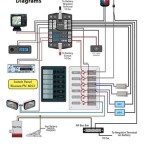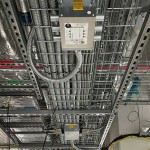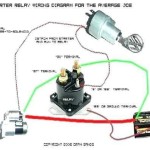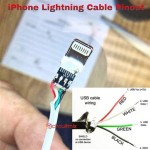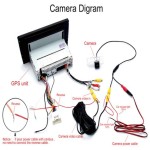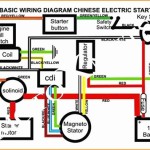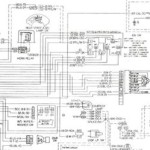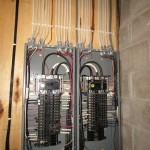A tow hitch wiring harness is an electrical connector that allows a vehicle to tow a trailer. It provides a secure connection between the vehicle’s electrical system and the trailer’s lights, brake lights, and turn signals. For example, when a driver connects a tow hitch wiring harness to their vehicle and attaches a trailer, the harness will ensure that the trailer’s brake lights illuminate when the vehicle’s brake pedal is pressed.
Tow hitch wiring harnesses are essential for safe towing, as they enable the driver to control the trailer’s movements and communicate with other drivers on the road. They also protect the vehicle’s electrical system from damage caused by overloading. A key historical development in tow hitch wiring harnesses was the introduction of plug-and-play connectors, which made installation easier and reduced the risk of wiring errors.
In the following sections, we will explore the different types of tow hitch wiring harnesses available, their features and benefits, and how to choose the right harness for your specific needs.
Understanding the essential aspects of tow hitch wiring harnesses is crucial for safe and effective towing. These harnesses play a vital role in connecting the vehicle’s electrical system to the trailer’s lighting and signaling systems, ensuring proper communication and control while towing. Here are nine key aspects to consider:
- Type: Tow hitch wiring harnesses come in various types, including vehicle-specific harnesses, universal harnesses, and custom harnesses. Choosing the correct type is essential for compatibility and functionality.
- Connector: The connector type determines how the harness connects to the vehicle’s electrical system. Common connector types include 4-pin, 5-pin, and 7-pin connectors.
- Length: The harness length should be appropriate for the distance between the vehicle’s electrical socket and the trailer’s connection point.
- Wiring: The harness wiring should be of sufficient gauge to handle the electrical load of the trailer’s lights and signals.
- Durability: The harness should be made of durable materials that can withstand exposure to the elements and road conditions.
- Ease of installation: Look for harnesses that are easy to install, with clear instructions and minimal tools required.
- Features: Some harnesses offer additional features, such as built-in circuit protection, LED lighting, or integrated modules for specific trailer functions.
- Compatibility: Ensure that the harness is compatible with both the vehicle and the trailer being towed.
- Safety: A properly installed and functioning tow hitch wiring harness is essential for safe towing, preventing electrical problems and ensuring reliable communication between the vehicle and trailer.
These aspects play a crucial role in the performance and safety of tow hitch wiring harnesses. By considering these factors when selecting and installing a harness, you can ensure a secure and reliable connection for your towing needs.
Type
The type of tow hitch wiring harness is a critical component of a tow hitch wiring harness. Choosing the correct type of harness is essential for ensuring compatibility and functionality between the vehicle and the trailer being towed. Selecting the appropriate harness type depends on factors such as the make and model of the vehicle, the type of trailer being towed, and the specific features and functions required.
For example, vehicle-specific harnesses are designed to be compatible with a particular make and model of vehicle, offering a precise fit and seamless integration with the vehicle’s electrical system. Universal harnesses, on the other hand, are designed to be adaptable to a wider range of vehicles, providing a more versatile solution. Custom harnesses can be tailored to meet specific requirements or accommodate unique trailer configurations.
Understanding the different types of tow hitch wiring harnesses and their intended applications is crucial for selecting the most suitable harness for your towing needs. By choosing the correct type of harness, you can ensure a secure and reliable connection between the vehicle and trailer, enabling proper communication and control while towing.
Connector
The connector is a critical component of a tow hitch wiring harness, determining the type of electrical connection between the vehicle and the trailer. Understanding the different connector types is essential for selecting the most suitable harness for your towing needs. Common connector types include 4-pin, 5-pin, and 7-pin connectors, each with its own specific functions and applications.
- 4-pin connector: The 4-pin connector is the most basic type of tow hitch wiring harness connector. It provides the essential electrical connections for the trailer’s tail lights, brake lights, and turn signals.
- 5-pin connector: The 5-pin connector adds a reverse light connection to the 4-pin connector. This is necessary for trailers that have reverse lights.
- 7-pin connector: The 7-pin connector is the most comprehensive type of tow hitch wiring harness connector. It provides all the connections of the 4-pin and 5-pin connectors, plus an additional connection for auxiliary power. This is necessary for trailers that have electric brakes or other features that require additional power.
Determining the correct connector type for your towing needs depends on the type of trailer you are towing and the features it has. By matching the connector type on the tow hitch wiring harness to the connector type on the trailer, you can ensure a secure and reliable electrical connection for safe and effective towing.
Length
The length of a tow hitch wiring harness is a critical component that ensures a proper and secure connection between the vehicle and the trailer’s electrical systems. Understanding the relationship between the harness length and the towing setup is essential for safe and effective towing.
When the harness length is insufficient, it can lead to strain on the electrical connections, potentially causing damage to the wiring or the connector. This can result in intermittent or complete failure of the trailer’s lights, brake lights, or turn signals, which poses a significant safety hazard. Conversely, excessive harness length can create unnecessary slack, increasing the risk of tangles or snags that could also lead to electrical problems.
To determine the appropriate harness length, measure the distance from the vehicle’s electrical socket to the trailer’s connection point while the trailer is in its towing position. Add a few extra feet to allow for movement and turns. Choosing a harness with the correct length ensures a secure connection, prevents strain on the wiring, and eliminates excess slack, contributing to the overall safety and reliability of the towing setup.
In summary, the length of a tow hitch wiring harness is a critical factor that directly impacts the safety and functionality of the towing system. By selecting a harness with the appropriate length, you can ensure a reliable electrical connection between the vehicle and the trailer, preventing electrical problems and potential hazards while towing.
Wiring
The electrical wiring within a tow hitch wiring harness plays a critical role in ensuring proper functionality and safety while towing a trailer. Understanding the components, implications, and importance of sufficient wiring gauge is essential for selecting and using the right harness for your towing needs.
- Wire Gauge: Wire gauge refers to the thickness or diameter of the electrical wire used in the harness. Thicker wires have a lower gauge number and can carry more electrical current without overheating.
- Electrical Load: The electrical load refers to the amount of electrical current that the trailer’s lights and signals require to operate properly. This varies depending on the number and type of lights and signals on the trailer.
- Voltage Drop: When electricity flows through a wire, some voltage is lost due to resistance. Using a wire with a gauge that is too small for the electrical load can result in excessive voltage drop, leading to dim lights or malfunctioning signals.
- Safety Hazards: Insufficient wire gauge can lead to overheating, melted insulation, and electrical fires. This poses a significant safety hazard, especially when towing heavy trailers or in demanding conditions.
Choosing a tow hitch wiring harness with sufficient wire gauge is crucial for ensuring that the trailer’s lights and signals operate reliably and safely. By considering the electrical load of the trailer and the distance from the vehicle’s electrical socket to the trailer’s connection point, you can select a harness with the appropriate wire gauge for your towing needs.
Durability
The durability of a tow hitch wiring harness is of paramount importance for reliable and safe towing. A durable harness can withstand the harsh elements and demanding road conditions encountered while towing, ensuring uninterrupted electrical connectivity between the vehicle and the trailer.
Exposure to moisture, road salt, and extreme temperatures can take a toll on the harness if it is not constructed from durable materials. Corrosion, fraying, and insulation damage can occur, leading to electrical malfunctions and potential safety hazards. A durable harness, on the other hand, can endure these challenges, maintaining its integrity and functionality over time.
Real-life examples of durable tow hitch wiring harnesses include those made from high-quality materials such as PVC, nylon, and polyurethane. These materials offer excellent resistance to moisture, abrasion, and temperature fluctuations. Additionally, harnesses with sealed connections and shielded wiring provide enhanced protection against the elements and road debris.
The practical significance of understanding the importance of durability in tow hitch wiring harnesses lies in ensuring safe and reliable towing operations. By choosing a durable harness, you can minimize the risk of electrical problems, trailer light malfunctions, and potential accidents caused by poor electrical connectivity.
In summary, the durability of a tow hitch wiring harness is a critical factor that directly impacts the safety and reliability of your towing setup. By investing in a durable harness, you can enjoy peace of mind knowing that your trailer’s lights and signals will function properly, even in challenging conditions.
Ease of installation
Ease of installation is a critical aspect of tow hitch wiring harnesses, contributing directly to the overall user experience and safety. A well-designed harness with clear instructions and minimal tool requirements makes the installation process straightforward and less time-consuming, even for those with limited technical skills.
Real-life examples of easy-to-install tow hitch wiring harnesses include plug-and-play harnesses that connect directly to the vehicle’s existing electrical system without the need for cutting or splicing wires. These harnesses often come with detailed instructions and color-coded connectors, making the installation process intuitive and hassle-free.
The practical significance of understanding the importance of ease of installation lies in ensuring a secure and reliable connection between the vehicle and the trailer. A poorly installed harness can lead to electrical problems, trailer light malfunctions, and potential safety hazards. By choosing a harness that is easy to install correctly, you can enhance the overall safety and functionality of your towing setup.
In summary, the ease of installation of a tow hitch wiring harness is a crucial factor to consider, particularly for those who prefer a more straightforward and less time-consuming approach to towing preparation. By selecting a harness with clear instructions and minimal tool requirements, you can ensure a secure and reliable electrical connection between your vehicle and trailer, contributing to a safer and more enjoyable towing experience.
Features
Additional features offered by some tow hitch wiring harnesses can greatly enhance their functionality, safety, and user experience. These features go beyond the basic electrical connections to provide additional benefits that can improve the towing experience.
- Built-in Circuit Protection: Circuit protection devices guard against electrical overloads and short circuits, preventing damage to the wiring, harness, and vehicle’s electrical system.
- LED Lighting: LED lights have a longer lifespan, higher efficiency, and brighter output than traditional incandescent bulbs. They provide improved visibility and safety, especially in low-light conditions.
- Integrated Modules: Specialized modules can be integrated into the harness to provide additional capabilities, such as trailer brake controllers or reverse camera systems, enhancing the towing experience and safety.
- Customizable Functions: Some harnesses offer customizable functions, allowing users to program specific settings or features to meet their unique towing needs.
These additional features provide tangible benefits such as increased safety, improved visibility, enhanced functionality, and greater user control. By carefully considering the features offered by different tow hitch wiring harnesses, users can select the most suitable harness for their specific towing needs and preferences.
Compatibility
Compatibility between the tow hitch wiring harness, the vehicle, and the trailer is paramount for safe and reliable towing. This compatibility ensures that the electrical systems of the vehicle and trailer communicate effectively, enabling proper functioning of the trailer’s lights, brake lights, and turn signals.
Vehicles and trailers have specific electrical requirements, and mismatched harnesses can lead to electrical faults, malfunctions, or even safety hazards. Incompatible harnesses may not provide the correct power or ground connections, resulting in dim or non-functioning lights, erratic brake light behavior, or even damage to the vehicle’s electrical system.
Real-life examples of compatibility issues include using a 5-pin harness on a vehicle that requires a 7-pin harness for trailer brake control. This can result in the trailer brakes not functioning properly, potentially leading to accidents. Conversely, using a 4-pin harness on a trailer that requires a 7-pin harness can result in the trailer’s turn signals not working, posing a safety hazard to other road users.
Understanding the importance of compatibility allows users to select the correct harness for their specific vehicle and trailer combination, ensuring safe and reliable towing operations. By matching the harness to the electrical requirements of both the vehicle and the trailer, users can avoid electrical problems, prevent safety hazards, and enjoy a smoother towing experience.
Safety
The safety implications of a properly installed and functioning tow hitch wiring harness are paramount in ensuring the reliability and safety of towing operations. A well-functioning harness is critical to maintaining proper communication between the vehicle and the trailer, enabling the trailer’s lights, brake lights, and turn signals to operate correctly. Without a properly installed harness, electrical problems can arise, potentially leading to safety hazards and compromising the overall towing experience.
A real-life example of the importance of a properly installed tow hitch wiring harness can be seen in the case of trailer brake failure. A faulty or improperly installed harness can disrupt the electrical connection between the vehicle and the trailer, causing the trailer brakes to malfunction. This can have catastrophic consequences, especially when towing heavy loads or navigating challenging road conditions.
Understanding the critical role of a tow hitch wiring harness in ensuring safety highlights the importance of regular inspections and maintenance. Inspecting the harness for any signs of damage, corrosion, or loose connections can help prevent electrical problems and potential safety hazards. Additionally, following the manufacturer’s instructions during installation and using the correct harness for the specific vehicle and trailer combination is essential for optimal performance and safety.
In summary, the safety implications of a properly installed and functioning tow hitch wiring harness cannot be overstated. By ensuring reliable electrical communication between the vehicle and the trailer, a well-maintained harness contributes significantly to the overall safety and reliability of towing operations, preventing electrical problems and potential hazards.










Related Posts

